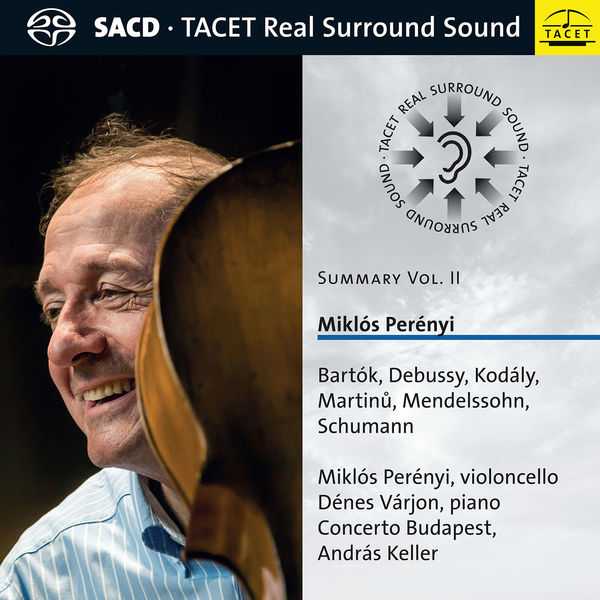
Composer: Béla Bartók, Claude Achille Debussy, Zoltan Kodály, Bohuslav Martinů, Felix Mendelssohn, Robert Schumann
Performer: Miklós Perényi, Dénes Várjon
Orchestra: Concerto Budapest
Conductor: András Keller
Format: FLAC (tracks)
Label: Tacet
Catalogue: TACET2684
Release: 2022
Size: 302 MB
Recovery: +3%
Scan: yes
01. Mendelssohn: Variations concertantes for Cello & Piano in D Major, Op. 17, MWV Q 19
02. Debussy: La plus que lente, L. 121 (Arr. Z. Kocsis for Cello & Piano)
Schumann: Cello Concerto in A minor, Op. 129
03. I. Nicht zu schnell
04. II. Langsam
05. III. Sehr lebhaft
06. Martinů: Variations on a Slovak Theme for Cello & Piano, H. 378
07. Kodály: Magyar rondó, K. 41 (Version for Cello & Piano)
Bartók: Violin Rhapsody No. 1, Sz. 87 (Arr. Cello & Piano)
08. I. Lassú. Moderato [1]
09. II. Friss. Allegretto moderato
10. I. Lassú. Moderato [2]
11. II. Friss. Allegretto moderato [Alternative Ending]
Miklos Perenyi is recognised as one of the great cellists of his generation, with a distinctive, subtly nuanced sound matched by extraordinary musicality. This disc showcases his virtuosity through works by Bartok, Debussy, Kodaly, Martinu, Menselssohn and Schumann.
Born in Hungary, Miklos Perenyi began cello lessons at the age of five with Miklos Zsamboki, a student of David Popper. At the age of nine, he gave his first concert in Budapest and studied between 1960 and 1964 with Enrico Mainardi in Rome and with Ede Banda in Budapest. In 1963 he became a prize winner at the International Pablo Casals Cello Competition in Budapest. Casals invited him to his master classes in Puerto Rico in 1965 and 1966. Since then Mikls Perenyi became a frequent visitor to the Marlboro Festival. In 1974, Miklos Pernyi joined the faculty at the Franz Liszt Academy in Budapest, where he holds a professorship until today. He was honored with the Kossuth-Prize in 1980, with the Bartk-Psztory-Prize in 1987 and with the Hungarian “Artist of the Nation” Award in 2014.